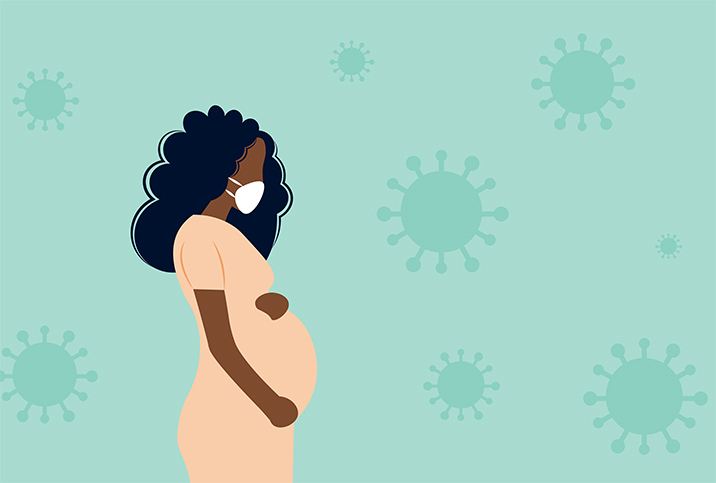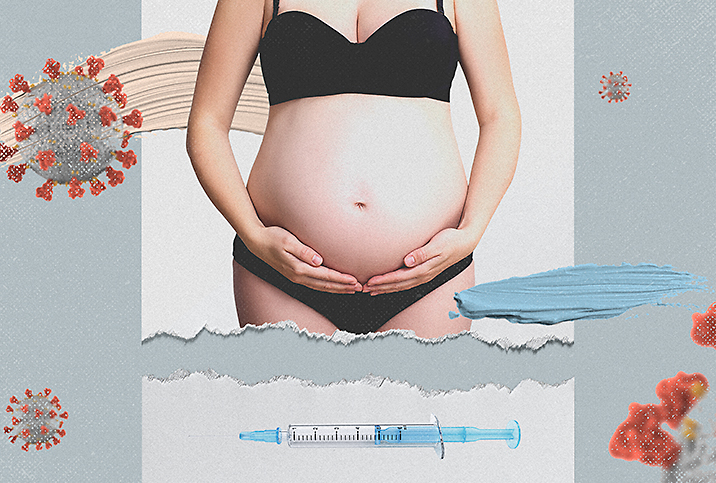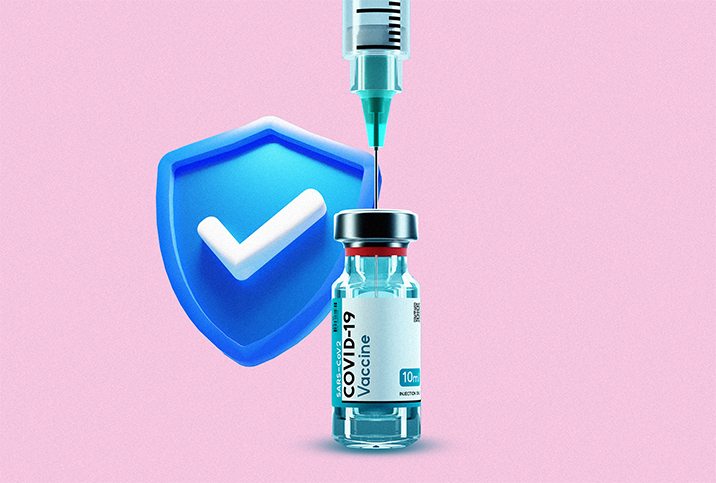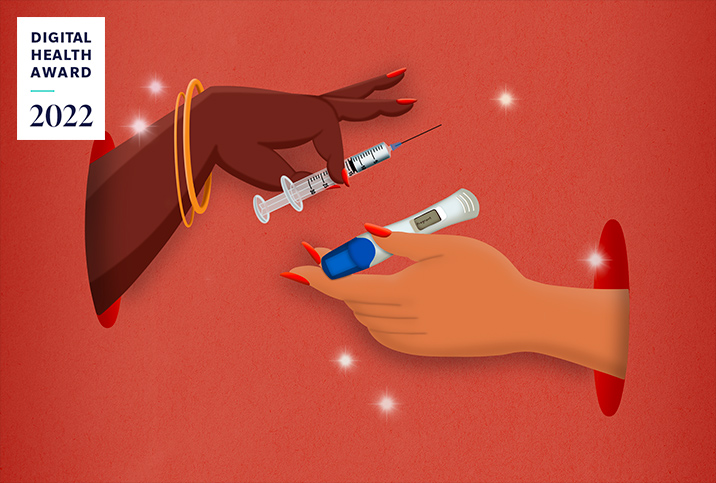Vaccinated Pregnant Women Experience Milder COVID-19 Symptoms

Pregnancy comes with excitement and stress as you spend those nine months preparing for your baby's arrival. A huge part of that preparation lies in remaining healthy throughout your pregnancy—which can be difficult in our current health climate.
Our struggle to return to normal continues two years after the start of the COVID-19 pandemic, despite loosening restrictions across the country. The onset of the new omicron BA.2 variant is projected to cause a surge in domestic coronavirus cases. The strain is inherently more transmissible, according to the World Health Organization (WHO), but unlikely to cause a resurgence of hospitalizations.
News of emerging variants and possible global resurgences can fuel anxiety to take extra precautions to remain healthy. It's more imperative than ever to make active and health-conscious decisions that benefit your well-being—because your well-being is also your baby's.
Vaccinations are a great step to protect yourself and your child from the negative implications of COVID, especially while pregnant. Yet according to 2021 data from the Centers for Disease Control and Prevention (CDC), only 31 percent of pregnant women are vaccinated, and these rates vary greatly by race and ethnicity. Hesitancy in getting the vaccine is common, however, pregnant women have various health reasons to seriously consider it.
The importance of vaccination for pregnant women
When you become pregnant, your body changes in more ways than you realize, particularly in your immune system.
"Pregnancy lowers the immune system. In general, pregnant women are more prone to getting any infection in frequency. So they would also be more susceptible to getting COVID and that's why they have to be more careful," explained Daniel Roshan, M.D., a high-risk maternal-fetal OB-GYN in New York City.
The body's immune system has to balance protecting the mother and child from infections and allowing the growth of the fetus inside the body. This immune response brought on by pregnancy is a complex process that changes the way the mother's immune system interacts with her environment, according to Roshan.
Susceptibility is only one part of the equation. A lowered immune system places you at risk for developing more severe infections, as well. These conditions place pregnant women in the high-risk category, because they could develop a more serious case of COVID-19 even from the milder strains we're experiencing.
Forgoing the vaccine places yourself and your baby at greater risk for hospitalization and need for mechanical ventilation, and a slightly higher risk of dying from COVID-19.
"Pregnant women who become infected with COVID risk higher rates of preterm delivery, stillbirth and death of their child within the month," said Mana Kasongo, M.D., a board-certified emergency physician in Leesburg, Georgia. "[Mothers] also risk acquiring long COVID, a constellation of symptoms that appear after clearing the infection, such as fatigue, brain fog, body aches and respiratory problems."
Vaccinations lessen the impact of COVID-19
Vaccinations are not 100 percent effective at preventing COVID. However, as a pregnant woman, a vaccine increases your immune system's protection and greatly decreases your chances of negative or life-threatening health consequences if you do catch the virus.
"The COVID symptoms in vaccinated pregnant women tend to be milder. They require less hospitalization and their risk of death is lower," Kasongo said.
Pregnant people can expect to experience similar symptoms as nonpregnant vaccinated patients. These symptoms can include:
- Fever
- Cough
- Headache
- Shortness of breath
- Muscle pain
- Sore throat
- Loss of taste or smell
The recovery period also looks similar to that of nonpregnant patients. Infected pregnant people should quarantine, treat the symptomatic ailments of COVID and rest as much as possible. Roshan said he has observed fairly quick recoveries from vaccinated pregnant women. He attributes this to omicron being less aggressive than previous variants. Regardless, a follow-up visit with your obstetrician is necessary after you fully recover.
Pregnant women should see their doctor immediately if they start to experience respiratory symptoms or are unable to keep food and/or fluids down, Kasongo said. Treatment options include IV hydration, nebulizer breathing treatments, anti-nausea medications and monitoring of the baby.
Roshan recommended monoclonal antibody treatment for moderate to severe cases of COVID in pregnant women. This type of treatment is extremely effective for high-risk patients and can significantly reduce the chances of further COVID complications.
Vaccinated pregnant people experience milder COVID-19 symptoms should they acquire the virus, but the benefits extend even further. When vaccinated, our bodies create antibodies to fight off viral threats, and these can be used to safeguard your baby.
"[The] majority of the recent studies agree that the antibodies will transfer from mother to baby. So, therefore, babies are more protected at the beginning of their lives," Roshan said.
What the research says
A 2021 study published in the Journal of Obstetrics & Gynecology indicated that COVID-19 antibodies are transferred via placenta and breast milk in pregnant women who received Pfizer and Moderna vaccines. Another 2021 study, published in Clinical Infectious Diseases, backed the finding of transplacental neonatal protection from expectant mothers who had received the mRNA vaccines.
A February 2022 study published in JAMA Pediatrics suggested that even the level of acquired protection differed between vaccinated mothers and unvaccinated mothers who recovered from COVID-19. More antibodies were present in vaccinated mothers, and those antibodies were subsequently passed to their children. As a result, vaccinated mothers were able to offer longer COVID-19 protection to their babies than mothers who acquired natural immunity.
Vaccines are safe and effective
Despite unproven information online that engenders controversy and hesitancy surrounding the vaccine, science continues to show how beneficial mRNA vaccines are for the mother and child. The available research supports that vaccines are safe and highly effective in COVID-19 prevention and recovery. Both the CDC and the American College of Obstetricians and Gynecologists (ACOG) recommend the mRNA vaccine for pregnant women.
New research continues to make connections and expand our understanding of COVID-19, pregnancy and vaccines.
"The vaccine is a new vaccine, but the technology was studied for a long time; it just wasn't used until recently," Roshan said. "That's why the vaccine came up quickly, but the mRNA technology was always there."


















